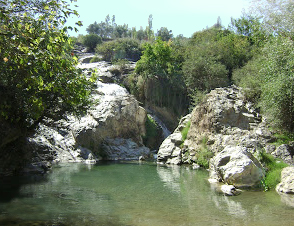Pactolus

Pactolus (Greek: Πακτωλός), also called Chrysorrhoas (Χρυσορρόας), the modern Sart Çayı 'Sardis stream', is a river near the Aegean coast of Turkey. The river rises from Mount Tmolus, flows through the ruins of the ancient city of Sardis, and empties into the Gediz River, the ancient Hermus. The Pactolus once contained electrum that was the basis of the economy of the ancient state of Lydia, which used the naturally occurring alloy of gold and silver to mint the first coins under Alyattes of Lydia.
Name
[edit]Pseudo-Plutarch in the De fluviis writes that the river was initially called Chrysorrhoas (Χρυσορρόας 'streaming with gold') because according to the legend, Chrysorrhoas (the son of Apollo) threw himself into the river.[1][2]
Later it was called Pactolus, from Pactolus, the son of Leucothea, who during a festival of Aphrodite failed to recognize his own sister, Demodice, and ravished her. Upon realizing what he had done, overwhelmed with grief, he threw himself into the river. Because of this the name of the river changed from Chrysorrhoas to Pactolus.[2]
Legend
[edit]As a river-god, Pactolus was said to be the brother of another river Hydaspes,[3] and thus, offspring of the Titans Oceanus and Tethys.[4] He was the father of Euryanassa, one of the possible mothers of Tantalus’ children.[5][AI-generated source?]
The only myth where Pactolus was an active participant is recounted in Nonnus’ Dionysiaca detailing the young god, Dionysus, in his Indian campaign. According to legend, King Midas divested himself of the golden touch by washing himself in the river.[6] The historian Herodotus claimed that the gold contained in the sediments carried by the river was the source of the wealth of King Croesus, son of Alyattes.
In Sophocles' Philoctetes, the chorus recognizes Gaia as ruler of the "golden stream Pactolus."[7]
Propertius 1.6
[edit]The river is mentioned in Sextus Propertius' Elegy 1.6.
"at tu seu mollis qua tendit Ionia, seu qua Lydia Pactoli tingit arata liquor..."
("But wherever either soft Ionia extends, or wherever the water of the Pactulus stains the Lydian fields...") [8]
References
[edit]- ^ "Dictionary of Greek and Roman Geography (1854), Pactolus". Archived from the original on 2024-02-03. Retrieved 2024-02-03.
- ^ a b "Pseudo-Plutarch, De fluviis, 7". Archived from the original on 2024-02-03. Retrieved 2024-02-03.
- ^ Nonnus, 24.52 Archived 2021-08-22 at the Wayback Machine
- ^ Nonnus, 23.99 Archived 2021-08-22 at the Wayback Machine
- ^ Tzetzes ad Lycophron, 52 Archived 2024-02-26 at the Wayback Machine; Scholia ad Euripides, Orestes 4 & 11
- ^ Ovid, Met. XI.140-144.
- ^ Sophocles. "Philoctetes".
- ^ Propertius, Elegies I.XI 31-32.


 French
French Deutsch
Deutsch